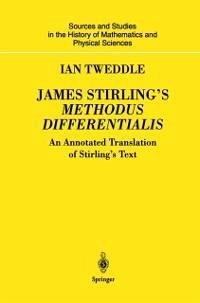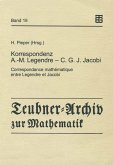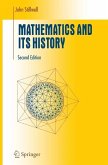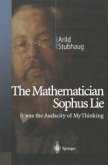A new translation makes this classic and important text more generally accessible. The text is placed in its contemporary context, but also related to the interests of practising mathematicians today. This book will be of interest to mathematical historians, researchers, and numerical analysts.
Dieser Download kann aus rechtlichen Gründen nur mit Rechnungsadresse in A, B, BG, CY, CZ, D, DK, EW, E, FIN, F, GR, HR, H, IRL, I, LT, L, LR, M, NL, PL, P, R, S, SLO, SK ausgeliefert werden.
From the reviews: "Ian Tweddle's new edition of James Stirling's Methodus Differentialis is a useful and important book. ... Tweddle has translated the Latin and added many notes. ... The blurb on the back cover describes the book as a classic of numerical analysis, and that seems exactly right. ... I hope that all serious libraries will consider buying a copy." (Fernando Q. Gouvêa, MathDL, February, 2004) "Issac Newton not only invented his 'fluxional' form of the calculus but also extended the range of functions to which it could be applied ... . One of his main followers in these directions was the Scot James Stirling (1692-1770), who ... recently has captured the interest of Ian Tweddle. ... Tweddle has made a notable contribution to our understanding of both the British Newtonian tradition and the history of numerical mathematics." (I. Grattan-Guinness, The Mathematical Gazette, March, 2005) "In 1730 James Stirling (1692-1770) published in London his book 'Methodus Differentialis: sive Tractatus de Summatione et Interpolatione Serierum Infinitarum'. Tweddle's new translation is fairly literal and based on a copy of Stirling's book ... . Many notes are added to the translation enabling Tweddle to give the reader necessary and helpful information. ... Tweddle's well annotated translation will make Stirling's work more generally accessible and he seems to be right that the reader will find in it much that is still relevant today." (K.-H. Schlote, Zeitschrift für Analysis und ihre Anwendungen, Vol. 23 (3), 2004) "The present book is an annotated English translation of Stirling's Methodus. ... This translation is a very welcome addition to the literature on history of mathematics, and specially of mathematical and numerical analysis. It provides to the reader an interesting material on series and on their manipulation, which can be used in teaching as well." (Jean Mawhin, Zentralblatt MATH, Vol. 1031, 2004) "The aim of this nice book is to make Stirling's work more generally accessible and to illustrate that it contains much that is still relevant today. ... With his book, Ian Tweddle eases our approach to Stirling's work. ... This neat book will give pleasure to all readers interested in understanding the origins of 'modern' numerical analysis (which paved the way for powerful computer programs); it may even inspire the search for new methods." (Walter Trebels, Mathematical Reviews, Issue 2004 i) "The treatise focuses on the question of accelerating series convergence. As a classic of numerical analysis the book certainly holds historical interest. The modern undergraduate will also find here a pleasant introduction to hypergeometric functions, still quite the hot topic ... . Summing Up: Highly recommended. Upper-division undergraduates through faculty." (D. V. Feldman, CHOICE, April, 2004)









